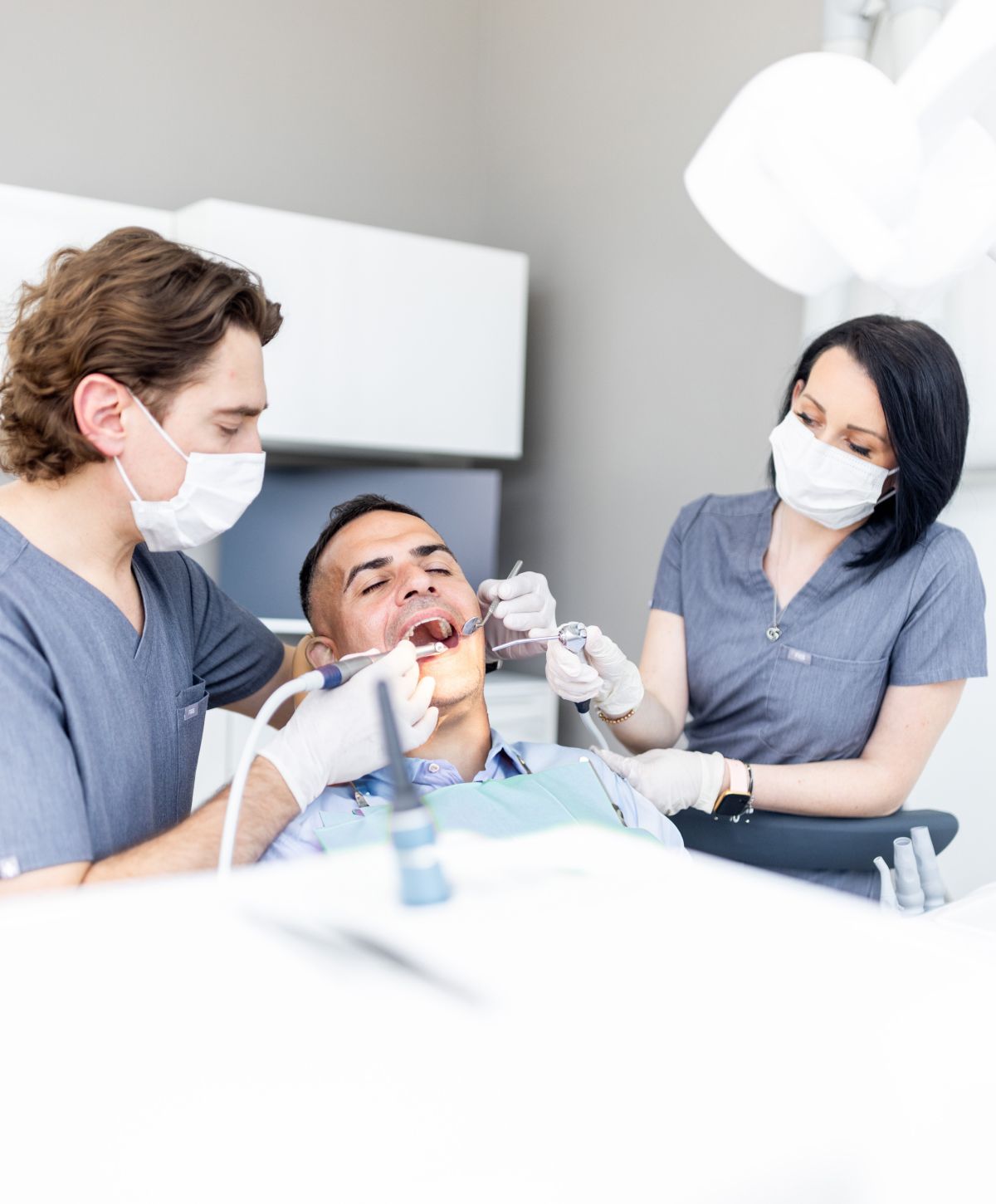
TMD Treatment
in Millburn & Clark, NJ
TMJ Relief Without Surgery
Why Choose Garden State Dental Design for TMJ disorder treatments?
At Garden State Dental Design, we understand the impact that temporomandibular disorder (TMD) can have on your daily life. From jaw pain and headaches to difficulty chewing, TMD can significantly affect your overall well-being. That’s why we’re dedicated to providing comprehensive TMD treatment for your unique needs.
Dr. Arthur Szabela, a dentist known for his empathy and expertise, offers a non-surgical approach to treating temporomandibular disorders in Clark and Millburn, NJ. Utilizing innovative techniques like Botox® and Platelet-Rich Growth Factor (PRGF), Dr. Szabela can effectively manage your TMJ symptoms and help you regain a pain-free smile.


TMJ Pain Treatments at a Glance
- Reduced Pain & Improved Function: These treatments aim to relieve pain, teeth grinding, headaches, painful clicking, and improve chewing function.
- Minimally Invasive Options: Dr. Szabela prioritizes non-surgical treatment methods like Botox® and PRGF injections for optimal comfort.
- Personalized Treatment Plans: Dr. Szabela tailors treatment plans to each patient's unique needs and severity of symptoms.
- Long-lasting Results: Many patients experience significant relief and improved jaw function for months or even years with proper treatment.
Conquer Jaw Pain
What is Temporomandibular Disorder?
Temporomandibular disorder, commonly referred to as TMD, is a condition that affects the temporomandibular joint (TMJ) and surrounding muscles, causing pain and dysfunction in the jaw joint and muscles that control jaw movement. It can result from various factors, including trauma, stress, teeth grinding, and misalignment of the jaw. Temporomandibular joint disorders can cause a variety of symptoms, including:
- Jaw pain and tenderness
- Clicking or popping sounds in the jaw
- Difficulty chewing or opening your mouth wide
- Facial pain and headaches
- Earaches
What TMJ treatment like?
Botox Treatment
Dr. Szabela may recommend Botox® injections to relax the jaw muscles around your jaw joint. This minimally invasive procedure involves injecting a small amount of Botox® into specific areas to alleviate muscle tension in facial muscles and reduce pain. The effects of Botox® typically last for several months, providing long-lasting relief.
PRGF Treatment
PRGF, or Platelet-Rich Growth Factor, utilizes your own blood platelets to promote healing and tissue regeneration. In treating TMJ disorders, Dr. Szabela may inject PRGF into your jaw joint to stimulate tissue repair and reduce inflammation, ultimately leading to improved joint function and pain relief.

Effective and Versatile
What conditions does treating TMJ disorders address?
TMJ treatment effectively addresses various symptoms associated with TMJ dysfunction, including:
- Jaw pain and tightness
- Clicking or popping sounds in the jaw
- Limited jaw mobility
- Sore jaw muscles
- Headaches and facial pain
- Difficulty chewing
Regain a Pain-Free Smile
What are the Benefits of TMD Treatment?
Seeking treatment for TMD can offer numerous benefits, including:
- Reduction in associated symptoms such as headaches or neck pain: The primary goal is relief from pain and discomfort in the jaw, face, and head.
- Improved jaw function and range of motion: Treatment can restore proper jaw movement, allowing for easier chewing and speaking, as well as prevention of further damage to the jaw joint and surrounding tissues.
- Enhanced quality of life and overall well-being: By managing TMJ symptoms, patients can experience a significant improvement in their overall quality of life.
- Minimally Invasive Options: Dr. Szabela prioritizes non-surgical approaches like Botox® and PRGF for optimal comfort and faster recovery.
- Long-lasting Results: With proper treatment, many patients experience sustained pain relief and improved jaw function for months or even years.

Don't Let TMJ Hold You Back
Am I a candidate for TMJ treatment?
If you experience any of the following symptoms, you may be a candidate for TMJ treatment:
- Jaw pain and tenderness
- Teeth grinding
- Clicking or popping sounds in the jaw
- Difficulty chewing or opening your mouth wide
- Facial pain and headaches
- Earaches
During a consultation, Dr. Szabela will conduct a thorough examination and discuss your medical history to determine if TMJ disorder treatment is right for you.
Find Lasting TMJ Solutions
TMJ Treatment Recovery
Treating temporomandibular joints with Botox® or PRGF injections is minimally invasive and requires minimal downtime. You may experience some mild discomfort or bruising at the injection site, which typically resolves within a few days. Most patients can return to their normal activities immediately following the procedure.
A Personalized Approach
TMJ Treatment Results
Following TMJ treatment, most patients experience a noticeable improvement in their symptoms within a few weeks. The effects of Botox® injections typically last for 3-6 months, while PRGF can provide long-term relief for several months or even years. Dr. Szabela will develop a personalized treatment plan to optimize your results and ensure long-lasting relief.
Ready to Say Goodbye to Jaw Pain?
Schedule Your TMD Consultation Today!
At Garden State Dental Design, we’re committed to helping you find relief from TMD symptoms and regain control of your oral health. Our team of skilled dentists, advanced technology, and personalized approach to care make us the premier choice for TMD treatment in Clark, NJ. Don’t let TMD hold you back any longer—schedule your consultation with us today and take the first step towards a pain-free smile.

TMJ Disorder
Frequently Asked Questions
Dr. Szabela offers a variety of TMJ treatment options to address your specific needs. These may include non-surgical approaches like Botox® and PRGF injections, oral appliance therapy to improve jaw alignment, or physical therapy to address muscle tension and dysfunction.
Insurance coverage for TMJ treatment varies depending on your healthcare provider and individual plan. Our staff can help you verify your specific coverage and navigate the insurance process.
The duration of nonsurgical treatments for TMJ disorders depends on the severity of the temporomandibular disorders and the chosen treatment approach. Some treatments, like Botox® injections to the jaw joints, may only require a single session, while others may involve multiple appointments spread over several weeks or months. Dr. Szabela will discuss the expected timeline during your consultation.
Botox injections are generally well-tolerated. Potential side effects like mild discomfort or bruising at the injection site typically resolve within a few days. PRGF treatment for TMJ disorders uses your own blood platelets, minimizing the risk of side effects. Dr. Szabela will discuss any potential risks associated with your recommended treatment plan during your consultation.
While there's no permanent cure for TMJ disorders, effective treatment can significantly manage symptoms and improve your quality of life. Dr. Szabela will develop a personalized treatment plan to achieve long-lasting relief.
During a TMD dentist appointment at Garden State Dental Design, we’ll begin by conducting a comprehensive evaluation of your symptoms, medical history, and oral health. This may involve a physical examination, diagnostic tests such as X-rays or CT scans, and possibly impressions of your teeth and bite.
Once we’ve gathered all the necessary information, we’ll discuss our findings with you and recommend a personalized treatment plan based on your individual needs and preferences. This may include a combination of therapies such as occlusal adjustments, oral appliances, physical therapy, or, in some cases, referral to specialists for further evaluation or treatment.
TMD symptoms can vary widely from person to person, but common signs may include:
- Jaw pain or tenderness
- Difficulty chewing or biting
- Clicking, popping, or grating sounds in the jaw joint
- Locking of the jaw
- Headaches or migraines
- Ear pain or ringing in the ears (tinnitus)
- Facial pain or fatigue
- Neck or shoulder pain

